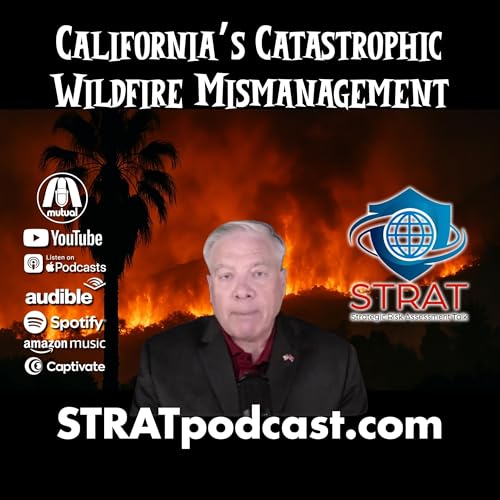California’s recent wildfire tragedies reveal far more than natural disaster—they expose deep failures in federal oversight, intelligence integration, emergency preparedness, and state-level accountability. In this episode, retired Marine Intelligence Officer Hal Kempfer examines why California continues to suffer catastrophic losses despite receiving substantial federal resources for prevention, mitigation, and consequence-management intelligence. Using the deadly Palisades fire as a case study, we break down allegations of state interference with firefighting operations, incomplete suppression of earlier burns, unfulfilled fuel-reduction promises, and years of misrepresented accomplishments in wildfire prevention. Kempfer also traces the history of federal all-hazards intelligence programs, how they were designed to support state and local decision-makers, and how California’s leadership rejected or redirected critical DHS-funded initiatives—hindering capabilities that could have saved lives and communities. Finally, Hal explores why a comprehensive, long-look federal investigation is urgently needed to address the systemic issues that span multiple administrations and continue to put millions at risk.
Takeaways:· The Palisades fire exposed major failures in California’s fire-prevention and emergency-management systems.
· New allegations suggest state officials may have limited key firefighting actions before the deadly blaze.
· Investigations show California overstated wildfire-prevention accomplishments by hundreds of percent.
· Fuel-reduction commitments were reduced or delayed despite repeated public claims of progress.
· DHS-funded intelligence programs meant to support emergency operations were halted by state leadership.
· California’s actions also affected other states seeking to implement all-hazards intelligence programs.
· Comprehensive consequence-management intelligence could have reduced losses in multiple disasters.
· A federal investigation—independent of DHS OIG—is needed to examine systemic misconduct across administrations.
#STRATPodcast #HalKempfer #MutualBroadcastingSystem #StrategicRiskAnalysis #WildfirePrevention #EmergencyManagement #CaliforniaFires #PalisadesFire #HomelandSecurity #DisasterPreparedness #ConsequenceManagement #FederalOversight #CrisisResponse #WildfirePolicy #PublicSafety #IntelligenceAnalysis #EmergencyResponse #GovernmentAccountability #RiskMitigation #DisasterResilience
 30 min
30 min 20 min
20 min 17 min
17 min 26 min
26 min 24 min
24 min 23 min
23 min 25 min
25 min 22 min
22 min
